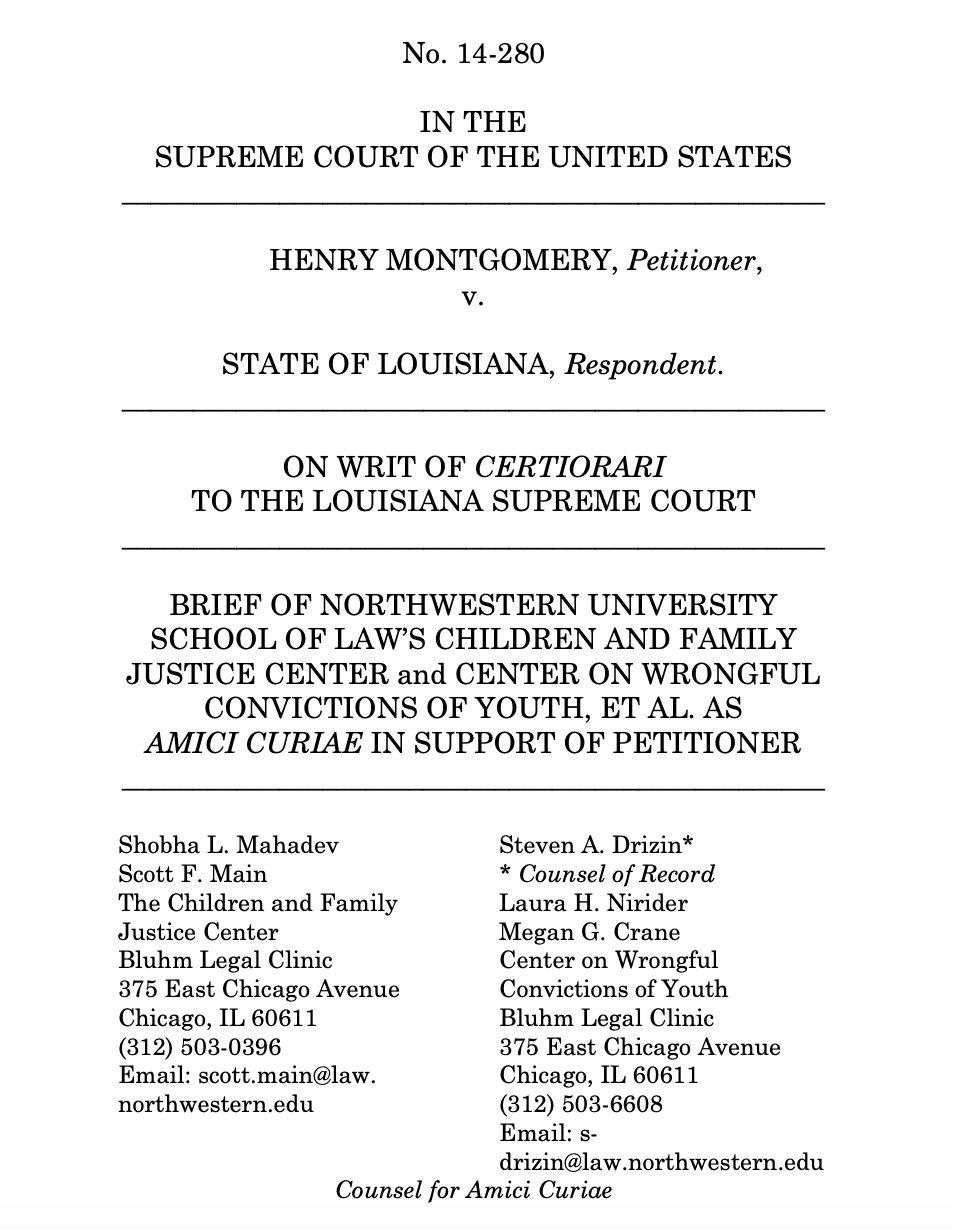
Summary of Argument
Over the past ten years, this Court has ushered in a new era in juvenile justice. A trio of Eighth Amendment decisions—Roper v. Simmons, Graham v. Florida, and Miller v. Alabama—has fundamentally reshaped the interactions children have with, and their permissible outcomes in, our criminal justice system. In those decisions, this Court placed categorical limits on the type and severity of punishment that may be imposed on those under the age of 18 and declared that criminal procedure laws that fail to account in any way for a defendant’s youthfulness are flawed. By grounding these decisions in scientific advancements regarding adolescent development and behavior, as well as a common sense trust in what we see with our eyes and know in our hearts about how children think and make decisions, this Court has made constitutionally manifest the simple, yet profound truth: youth matters.
These decisions mark the reversal of the previous decade’s alarming trend in favor of the increasingly punitive treatment of youth—a trend fueled by now-debunked fears of a coming generation of violent juvenile “super-predators.” By the end of the 1990s, these fears had driven almost every state to minimize or even erase important distinctions between children and adults in the criminal sentencing context. But relying on science, reason, and fundamental notions of decency embedded in the Eighth Amendment, this Court proclaimed in Roper v. Simmons and Graham v. Florida that children are categorically less culpable than adults for their actions; thus, it categorically banned the death penalty and, in non-homicide cases, life without parole sentences for youth who were younger than 18 at the time of their offenses. But in Miller v. Alabama, this Court extended this logic to categorically ban mandatory life without parole sentences for all youth who were younger than 18, even those convicted of homicide offenses; and it required lower courts to consider the “hallmark” attributes of youth—including immaturity, impulsivity, susceptibility to peer pressure, the inability to foresee risks and consequences, and the inability to extricate themselves from their home environments, no matter how dysfunctional—before imposing the severest possible sentence on a child. Miller cemented a seismic shift in Eighth Amendment jurisprudence relating to children. Given its significance, its categorical nature, and the precedents from which it descends, Miller is rightly viewed as both substantive and a watershed procedural rule and thus cannot be subjected to the Teague v. Lane bar on retroactivity.
Retroactive application is further warranted by principles of equity. The individualized, childcentered consideration that Miller demands was wholly absent for Henry Montgomery and the many other children whose crimes occurred before this Court’s decision in Miller. On November 13, 1963, Mr. Montgomery, a seventeen-year-old black youth, shot and killed Charles W. Hurt, a white police officer, in segregated East Baton Rouge, Louisiana. For that tragic act, Mr. Montgomery ultimately received a mandatory life without parole sentence and has spent the past fiftyone years in prison, fully expecting to draw his last breath there. But when Miller was decided on June 28, 2012, his expectations and hopes changed, as did the expectations and hopes of so many others who were similarly sentenced to mandatory life sentences that could not be constitutionally imposed today. Amici simply ask that these individuals’ youthfulness matter to this Court more than the dates on which their offenses occurred. Given the progress of our maturing society, there can be no justification for a state to impose an unconstitutional sentence on some but not others. Indeed, there can be no reason to allow Kuntrell Jackson, the petitioner in Miller’s companion case Jackson v. Hobbs, to benefit from a Miller resentencing hearing on state collateral review, as has occurred, but to deny Mr. Montgomery that same opportunity.
Amici submit that while it is true that human beings—even children—can commit terrible crimes that cause irreparable harm, this Court’s decisions in Roper, Graham, and Miller stand for the principle that because of their diminished culpability and their great capacity to change and rehabilitate, young people are more than their worst act. Science, reason, and law dictate that when a state condemns a child to die in prison for his or her crimes, it must do so based on the particularized consideration of the youth-specific factors that this Court enumerated in Miller. Such consideration is necessary and right, whether the crime occurred today, yesterday, or decades ago. In short, it is what humanity requires. Therefore, Amici respectfully request that this Court hold that Miller applies retroactively.
Open Amicus Brief as PDF